PART I: THE EARLY COLD WAR
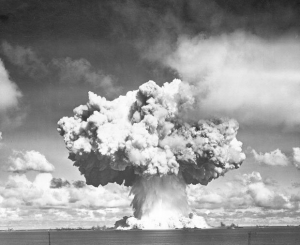 |
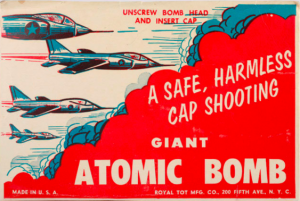 |
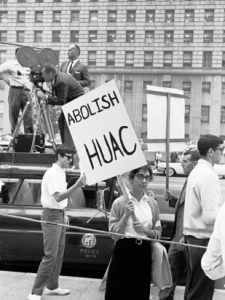 |
Orientation week: Course Logistics
Civil Defense film: Duck and Cover (1951).
“The Origins of the Cold War 1946-1960” (timeline at the Authentic History website)
Introduction to Academic Honesty Tutorial. PLEASE COMPLETE THE TUTORIAL NO LATER THAN NEXT WEDNESDAY, 9/13.
Discuss course registration and sign up for advising appointments.
Week 1: What Is “Cold War Culture”?
9/11: The Dawn of the Atomic Age
Paul Boyer, By the Bomb’s Early Light, Ch. 1.
President Harry Truman’s Statement Announcing the Use of the A-Bomb at Hiroshima (August 6, 1945). Alternatively, watch this archival recording of the speech.
Survival under Atomic Attack (short film, 1951)
Editors of Good Housekeeping, A Frightening Message for a Thanksgiving Issue (1958) in William H. Chafe, et al., ed., A History of Our Time, 8th ed. (Oxford Univ. Press, 2007).
Powerpoint: The Atomic Bomb and Cold War Culture
Discussion Questions [1] [2] [3] [4] [post your own]
9/13: A Culture of Unity? Of Conformity?
Peter J. Kuznick and James Gilbert, “U.S. Culture and the Cold War,” and Alan Brinkley, “The Illusion of Unity in Cold War Culture,” in Kuznick and Gilbert, ed., Rethinking Cold War Culture (Washington, D.C.: Smithsonian Institution Press, 2001), 1-13, 61-73.
Norman Vincent Peale,The Power of Positive Thinking, 6-22.
William Whyte, The Organization Man, excerpt.
The House in the Middle (1954).
In-class discussion of Academic Honesty Tutorial.
Discussion Questions [1] [2] [3] [post your own]
Week 2: The Red Scare
9/18: HUAC and McCarthyism
House Un-American Activities Committee, 100 Facts about Communism in the U.S.A. (1949) (READ THROUGH PAGE 21)
Communism (short film, 1952)
Senator Joseph McCarthy, “The Internal Communist Menace” (1950)
Margaret Chase Smith, Declaration of Conscience, 1950
The Cold War, episode 6: “Reds”
Discussion Questions [1] [2] [3] [4] [5] [post your own]
Powerpoint on Anti-Communist Ideology
In-class discussion of first essay assignment.
9/20: HUAC and Hollywood
Arthur Miller, The Crucible (1953)
HUAC testimony of Hollywood performers, writers, and producers:
Jack Warner, Louis Mayer, Ayn Rand
Powerpoint on Arthur Miller and HUAC
Discussion Question [1] [2] [3] [4] [post your own]
Week 3: Anti-Communism, Manhood, and Homophobia
9/24: Screening of On the Waterfront (1951) at 7:30 PM in AXT 110.
9/25: Elia Kazan and Naming Names
Discuss On the Waterfront; compare the film to Miller’s play.
Discussion Questions [1] [2] [3] [4] [post your own]
Powerpoint on Kazan and Naming Names
9/27: Cold War Masculinity and the “Lavender Menace”
K.A. Cuordileone, “Anti-Communism on the Right: The Politics of Perversion,” in Manhood and American Political Culture in the Cold War, 37-96.
Hearings in on homosexuality in government service in Major Problems in American History since 1945.
Powerpoint: “The Lavender Menace”
Discussion Questions [1] [2] [3] [4] [5] [6] [post your own]
Week 4: Television and McCarthy’s Demise / Venona Project / “Good” Families in the Cold War Era
10/2: The Army-McCarthy Hearings and the Venona Project
McCarthy-Welch exchange at Army-McCarthy Hearings
Edward R. Murrow – See It Now (March 9, 1954)
“Damage”: Collier’s Assesses the Army-McCarthy Hearings
John Earl Haynes and Harvey Klehr, “Venona: Decoding Soviet Espionage in America” (1999)
Powerpoint: Cold War TV, the Army-McCarthy Hearings, and Edward R. Murrow
Discussion Questions [1] [2] [3] [4] [post your own]
10/4: Family Togetherness as Civic Obligation
Elaine Tyler May, “Cold War, Warm Hearth: Politics and the Family in Postwar America” in Homeward Bound: American Families in the Cold War Era.
Please watch before class: In the Suburbs (1957).
Powerpoint: Nuclear Fears and Nuclear Families in the Cold War Era
Discussion Questions [1] [2] [3] [4] [post your own]
Week 5: “Bad” Women and Cold War and Gender
10/9: Women as Cold War Menace
May, “Explosive Issues: Sex, Women, and the Bomb” in Homeward Bound: American Families in the Cold War Era;
Mickey Spillane, One Lonely Night, excerpts.
Watch prior to class: Are You Popular? (1947) at the Prelinger Archives.
Discussion Questions [1] [2] [3] [4] [post your own]
10/10: Screening of The Manchurian Candidate (1962) at 7:30 PM in AXT 110.
10/11: The Manchurian Candidate and Cold War Gender Politics
Marynia Farnham and Ferdinand Lundberg, “The Psychopathology of Feminism” (1947)
Powerpoint: The Manchurian Candidate
Discussion Questions [1] [2] [3] [post your own]
10/13: Final draft of first essay due via email anytime before midnight today.
Week 6: Cold War Civil Rights
10/16: Cold War Civil Rights
Mary Dudziak, Cold War Civil Rights, 3-46; 79-114.
Powerpoint: Racial Injustice and Cold War Politics
Discussion Questions [1] [2] [3] [4] [post your own]
10/18: Martin Luther King, Jr., the Cold War, and Vietnam
Martin Luther King, Jr., “Beyond Vietnam: A Time to Break Silence,” April 4, 1967.
PART II: THE HIGH COLD WAR
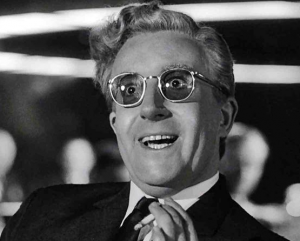 |
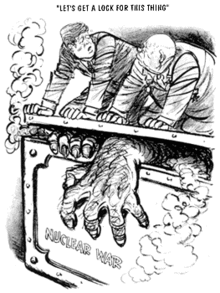 |
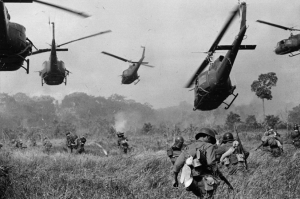 |
Week 7: The Cuban Missile Crisis
10/23 – No class – Midterm Recess
10-25 — Kennedy, Kruschev, and Cuba
The Cold War, episode 10: Cuba (1959-1962)
President John F. Kenndy, Speech on the Cuban Missile Crisis, October 22, 1962.
Interactive documentary on the Cuban Missile Crisis at the JFK Presidential Library website
Jutta Weldes, “The Cultural Production of Crises: U.S. Identity and Missiles in Cuba,” in Weldes, et al., ed., Cultures of Insecurity: States, Communities, and the Production of Danger (Minneapolis: University of Minnesota Press, 1999), 35-62.
Powerpoint: The Cuban Missile Crisis: Real or Culturally Produced?
Discussion Questions [1] [2] [3] [4] [5] [post your own]
10/27: First draft of second essay is due via email anytime before midnight today.
Week 8: The Cuban Missile Crisis and Rsing Opposition to the Cold War
10/29: Screening of Dr. Strangelove or: How I Learned to Stop Worrying and Love the Bomb (1964) at 7:30 PM in AXT 110.
10/30: Satirizing Mutually Assured Destruction
The Cold War: MAD, 1960-1972 (episode 12)
Discussion Questions [1] [2] [3] [4] [post your own]
11/1: College Students and Housewives Protest
The Cold War, episode 13:Make love, not war (the 1960s)
Students for a Democratic Society, The Port Huron Statement (1962)
Amy Swerdlow, “Ladies’ Day at the Capitol: Women Strike for Peace versus HUAC,” Feminist Studies 8:3 (Autumn, 1982), 493-520
Powerpoint: Women Strike for Peace and the New Left
Discussion Questions [1] [2] [3] [4] [5] [post your own]
PART III: THE SECOND COLD WAR
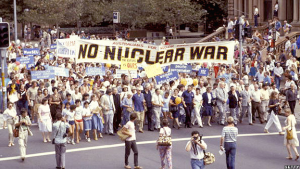 |
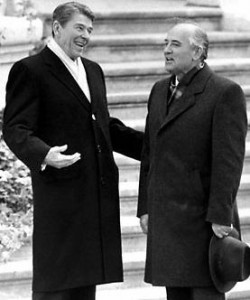 |
 |
Week 9: Nuclear Anxiety and National Politics
11/6: Politicians react to changing perspectives on Vietnam and nuclear war
Johnson 1964 campaign ad, “Daisy girl”
Johnson 1964 campaign ad, Ice cream”
Nixon 1968 campaign ad, “Vietnam”
Nixon 1972 campaign ad, “Russia”
Powerpoint: Vietnam and the Cold War
Discussion Question [1] [2] [3] [4] [post your own]
11/8: Reagan and The Evil Empire
The Cold War: A Very Short Introduction, chapter 8.
President Reagan’s Speech to the National Association of Evangelicals
Orlando, Florida on March 8, 1983. (The “Evil Empire” Speech); See video also.
Mondale-Ferraro campaign ad: “Arms Control”
Reagan 1984 campaign ad, “Peace”
Reagan, Address to the Nation on Defense and National Security, March 23, 1983
Lee Greenwood, “God Bless the USA” (live in 1985)
Ronald Reagan Campaign video: “A New Beginning” (aired at 1984 RNC)
Powerpoint: Reagan and the Evil Empire
Discussion questions [1] [2] [3] [4] [post your own]
Week 10: Ronald Reagan, Cold Warrior
11/13: Final drafts of second essay are due via email anytime before midnight today.
11/13: Imagining Nuclear Apocalypse in the 1980s
The Day After (ABC, 1983)
William F. Buckley, “The Day After,” National Review (December 23, 1983), 1632;
Jonathan Schell, The Fate of the Earth (1982), excerpted in Howard Zinn et al., The Power of Nonviolence: Writings by Advocates of Peace (2002).
Powerpoint: The Day After and the Nuclear Debate in the 1980s
Discussion Questions [1] [2] [3] [4] [post your own]
11/13: Screening: Star Wars (George Lucas, 1977) at 7:30 in AXT110.
11/15: Science Fiction and the Late Cold War
Week 11: The Cold War Ends
11/19: Screening of The Terminator at 7:30 PM in AXT 110.
11/20: Nuclear Menace in the Mass Culture of the Late Cold War
Paul Boyer and Eric Idsvoog, “Nuclear Menace in the Mass Culture of the Late Cold War and Beyond,” Fallout (1998), 199-225.
Powerpoint: Filmic Portrayals of Nuclear Catastrophe in the Late Cold War and Beyond
Discussion Questions [1] [2] [3] [4] [5] [post your own]
11/22: NO CLASS — THANKSGIVING BREAK
PART IV: AFTER THE COLD WAR
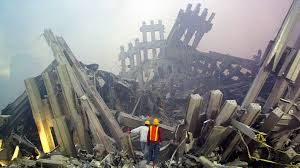 |
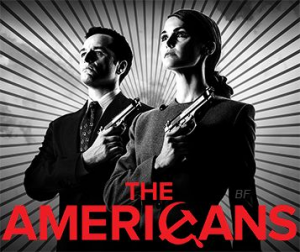 |
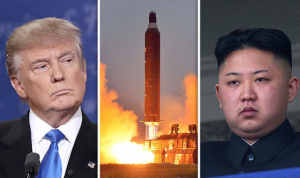 |
Week 12: Nostalgia for the Cold War
11/27: Losing the Cold War Frame of Reference
Daniel T. Rodgers, “Losing the Words of the Cold War,” The Age of Fracture (2011), 15-40.
Jon Wiener, “Hippie Day at the Reagan Library,” How We Forgot the Cold War: A Historical Journey Across America (Berkeley: University of California Press, 2012), 13-28.
Powerpoint: Cold War Nostalgia
Discussion Questions [1] [2] [3] [4] [post your own]
11/27: Screening of The Manchurian Candidate (2004) at 7:30 PM in AXT 110.
11/29: Research paper topic and list of sources that includes three primary and two secondary sources are due.
11/29: Nostalgia for the Cold War
Mark Wildermuth, “Electronic Media and the Feminine in the National Security Regime: The Manchurian Candidate before and after 9/11,” The Journal of Popular Film and Television 35:3(October 2007).
Junghyun Hwang,“From the End of History to Nostalgia: The Manchurian Candidate, Then and Now,” Journal of Transnational American Studies, 2:1(2010), 1-19.
Discussion Question [1] [2] [3] [4] [5] [post your own]
Week 13: Cold War 2? World War III?
12/4: Reviving the Language of the Cold War in the Age of Trump
Evan Osnos, David Remnick, Joshua Yaffa, “Trump, Putin, and the New Cold War,” Washington Post, March 6. 2017.
Remarks by President Trump to the 72nd Session of the United Nations General Assembly, Sept. 19, 2017. [see video of speech]
Read/watch BBC commentary on Trump’s UN speech
Discussion Questions [1] [2] [3] [4] [5] [post your own]
12/6: The Cold War as Period Drama: The Case of The Americans. In-class screening.
The Americans (FX, 2013-) – Official Website
Rob Sheffield, “Red-Hot Cold Warriors,” Rolling Stone (Mar. 13, 2014): 31.
Jeremy Egner, “Those Cute Spies around the Corner,” New York Times (Jan. 27, 2013), AR20.
Rob Sheffield, “Father, Mother, Teenager, Spy,” Rolling Stone (Apr 7, 2016): 32.
Discussion Questions [1] [2] [3] [post your own]
12/17: Final draft of research paper due via email anytime before 10:00 PM on December 17.